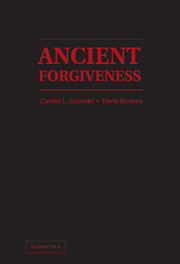Book contents
- Frontmatter
- Contents
- Contributors
- Preface
- Part I The Territory Philosophically Considered
- II Forgiveness Among The Greeks
- 2 Assuaging Rage
- 3 Achilles, Psammenitus, and Antigone
- 4 All in the Family
- Part III Forgiveness Among The Romans
- Part IV Judaic And Christian Forgiveness
- Bibliography of Works Cited
- Index
4 - All in the Family
Forgiveness and Reconciliation in New Comedy
from II - Forgiveness Among The Greeks
Published online by Cambridge University Press: 05 January 2012
- Frontmatter
- Contents
- Contributors
- Preface
- Part I The Territory Philosophically Considered
- II Forgiveness Among The Greeks
- 2 Assuaging Rage
- 3 Achilles, Psammenitus, and Antigone
- 4 All in the Family
- Part III Forgiveness Among The Romans
- Part IV Judaic And Christian Forgiveness
- Bibliography of Works Cited
- Index
Summary
From the modern perspective, forgiveness is in its core form an interpersonal act in which a person consciously gives up resentment or settled anger toward another after a sincere expression of contrition. The closest Greek equivalent to forgiveness is sungnōmē, which, however, has a broader range of meaning including recognition, understanding, forbearance, pardon, and excuse. The fundamentally cognitive aspect of the Greek concept is evident in Aristotle’s definition of sungnōmē as “understanding [gnōmē] that judges correctly what is fair,” meaning “correct judgment of what is truly fair” (EN 1143a23–24). The emphasis on intellectual judgment based on truth in this definition shows clearly that the Greek concept of sungnōmē has a different centering point from the modern one of forgiveness, which emphasizes the interaction of two persons with accompanying emotional change. The circles representing the behavioral range corresponding to Greek sungnōmē and modern forgiveness do, however, have a space of intersection, which is clearly identifiable in the uses of sungnōmē in the late classical period. An important way of analyzing this intersection is to look at the stories told in Greek literature, and my particular interest concerns the relationship of forgiveness to the identity and formation of dramatic genres. The word sungnōmē appears but seldom in Attic tragedy, and acts of forgiveness are rare and peripheral because tragedy was about moral choices made in the face of the irreparable harm that human beings do one another. New Comedy, however, as we know it from Menander, was created from a reworking, or even a reversal, of tragic form in which the potential harm that characters might do to one another was blocked or repaired by a combination of chance and the capacity to forgive. In analyzing Greek drama, particularly Menandrian comedy, I am concerned to show how cognitive assessment of what is forgivable is affected by bonds of affection, moral character, and learned social roles.
- Type
- Chapter
- Information
- Ancient ForgivenessClassical, Judaic, and Christian, pp. 48 - 76Publisher: Cambridge University PressPrint publication year: 2011
- 1
- Cited by



